Recap of September’s T.G.I.M. screenings
 It was dark and dreary outside the Sidney & Berne Davis Art Center on Labor Day night. In spite of jet black skies, sharp cracks of thunder and pelting rain, a large group of cineastes braved the elements in order to watch this month’s sampling of independent films under consideration for inclusion in next March’s edition of the Fort Myers Film Festival. With one early exception, the films screened by Mike Kiniry up in the control room overlooking the grand atrium were as off-putting as the stormy weather outside – and the water cascading down one of the metal columns inside the cavernous room from an unseen hole somewhere in the roof
It was dark and dreary outside the Sidney & Berne Davis Art Center on Labor Day night. In spite of jet black skies, sharp cracks of thunder and pelting rain, a large group of cineastes braved the elements in order to watch this month’s sampling of independent films under consideration for inclusion in next March’s edition of the Fort Myers Film Festival. With one early exception, the films screened by Mike Kiniry up in the control room overlooking the grand atrium were as off-putting as the stormy weather outside – and the water cascading down one of the metal columns inside the cavernous room from an unseen hole somewhere in the roof  high above did little to ease the audience’s sense of foreboding.
high above did little to ease the audience’s sense of foreboding.
After an oddball 7-minute film titled Man’s Best Friend (shot right here in Southwest Florida) in which a man escapes the stresses of his job and marriage by donning a dog suit and taking on the persona of his canine, much to the exasperation and consternation of his long-suffering wife, the evening took on a somber note with The Stairs, in which a  now-elderly man listens to a tape recording of his father describing his most horrific experience in the Auschwitz death camp during World War II.
now-elderly man listens to a tape recording of his father describing his most horrific experience in the Auschwitz death camp during World War II.
The film’s merits aside, The Stairs was the kind of film that FMff Director Eric Raddatz and Producer Melissa Tschari DeHaven like best – a short, dense, multi-faceted story susceptible to multiple, sometimes conflicting interpretations. The film starts and ends with a flashback to a night when the man, then a child, sits at the top of the stairs  eavesdropping on his parents’ conversation with a couple they’d invited over for the night. A number of audience members felt that this device gave the audience a nostalgic point of entry into the terrible story about how his father was spared being gassed on the day of his arrival at the camp. “The most important line in the film was, ‘He knew I was on the stairs,’” emphasized one attendee, who remarked that this line of dialogue drew him in and made the story personal in a way otherwise unimaginable.
eavesdropping on his parents’ conversation with a couple they’d invited over for the night. A number of audience members felt that this device gave the audience a nostalgic point of entry into the terrible story about how his father was spared being gassed on the day of his arrival at the camp. “The most important line in the film was, ‘He knew I was on the stairs,’” emphasized one attendee, who remarked that this line of dialogue drew him in and made the story personal in a way otherwise unimaginable.
 Celebrity judge Dan Miller also applauded the filmmaker’s efforts to make the Holocaust personal for the film’s viewers, “especially a younger generation who may not have any concept of the violence of that era.” As a youth growing up in Chicago, Miller attended many seminars and workshops where people shared their first-hand experiences in the Holocaust. “When you think of 6 million people dying, it’s such an abstract, but when you hear a survivor relay their own personal stories, it becomes highly, highly personal.” [Miller could not have been more correct. In the fall of 1944, Adolf
Celebrity judge Dan Miller also applauded the filmmaker’s efforts to make the Holocaust personal for the film’s viewers, “especially a younger generation who may not have any concept of the violence of that era.” As a youth growing up in Chicago, Miller attended many seminars and workshops where people shared their first-hand experiences in the Holocaust. “When you think of 6 million people dying, it’s such an abstract, but when you hear a survivor relay their own personal stories, it becomes highly, highly personal.” [Miller could not have been more correct. In the fall of 1944, Adolf  Eichmann was in a Budapest casino with a group of high-level SS officers. They knew that Eichmann was the chief architect of the final solution and asked him whether he was worried about what would happen to him when Germany lost war. “Eichmann gave a very astute answer that shows he knew how the world worked,” said Nazi hunter Simon Wiesenthal when repeating this story. “‘A hundred dead people is a catastrophe,’ he said. ‘Six million dead is a statistic.'”]
Eichmann was in a Budapest casino with a group of high-level SS officers. They knew that Eichmann was the chief architect of the final solution and asked him whether he was worried about what would happen to him when Germany lost war. “Eichmann gave a very astute answer that shows he knew how the world worked,” said Nazi hunter Simon Wiesenthal when repeating this story. “‘A hundred dead people is a catastrophe,’ he said. ‘Six million dead is a statistic.'”]
 Not addressed, unfortunately perhaps, was the reason the father chose to tell his story of survival to an interviewer rather than to his son. What the father could not, would not share overtly with his boy was the guilt that never left him for living when everyone else died. “And that’s how I failed,” he says at the end of his story, describing how he picked up his clothes, quickly put them on, and
Not addressed, unfortunately perhaps, was the reason the father chose to tell his story of survival to an interviewer rather than to his son. What the father could not, would not share overtly with his boy was the guilt that never left him for living when everyone else died. “And that’s how I failed,” he says at the end of his story, describing how he picked up his clothes, quickly put them on, and  never looked back at the columns of naked Jews being herded like cattle into the gas chambers not far from the train depot that had brought them in cattle cars to the very gates of hell. Where others saw in him bravery and endurance, the father saw only cowardice and shame.
never looked back at the columns of naked Jews being herded like cattle into the gas chambers not far from the train depot that had brought them in cattle cars to the very gates of hell. Where others saw in him bravery and endurance, the father saw only cowardice and shame.
As The Stairs underscores, what one  celebrity judge misses, another picks up on, and what the judges don’t see, the audience does. Because of the symbiotic relationship shared by all T.G.I.M. participants, everyone leaves with a more robust understanding of even the most seemingly straightforward of films. This was the case with Aftermath, a 10-minute film shot in German and in Germany, with English subtitles that were easy to read.
celebrity judge misses, another picks up on, and what the judges don’t see, the audience does. Because of the symbiotic relationship shared by all T.G.I.M. participants, everyone leaves with a more robust understanding of even the most seemingly straightforward of films. This was the case with Aftermath, a 10-minute film shot in German and in Germany, with English subtitles that were easy to read.
 Aftermath featured a young woman who blacks out after binge drinking at a club and wakes up alone in a strange bed in an unknown apartment with no recollection of who she was with or what she did with him. But intrigued by her missing-in-action host’s extensive collection of vinyl records stacked on edge in floor-to-ceiling bookshelves, she hangs around and discovers she could actually like the
Aftermath featured a young woman who blacks out after binge drinking at a club and wakes up alone in a strange bed in an unknown apartment with no recollection of who she was with or what she did with him. But intrigued by her missing-in-action host’s extensive collection of vinyl records stacked on edge in floor-to-ceiling bookshelves, she hangs around and discovers she could actually like the  geeky guy with the “I love New York” tee who returns with donuts for breakfast.
geeky guy with the “I love New York” tee who returns with donuts for breakfast.
Sanibel super lawyer Jason Maughan found the exchange between the twosome “bloody brilliant” in the tradition of his favorite film, Twelve Angry Men. “Those two people, the dialogue between them, the chemistry, that was deserving of an award.”
 Harkening back to Robert DeNiro’s observation that the sign of a good actor is his (or her) ability to eat a sandwich during a scene without anyone noticing that’s what (s)he’s doing, Dan Miller was impressed by how well the woman in the film interacted with props. “She handled her cigarette like she’s actually smoked before.”
Harkening back to Robert DeNiro’s observation that the sign of a good actor is his (or her) ability to eat a sandwich during a scene without anyone noticing that’s what (s)he’s doing, Dan Miller was impressed by how well the woman in the film interacted with props. “She handled her cigarette like she’s actually smoked before.”
Singer/songwriter Julia DeTomaso honed in on 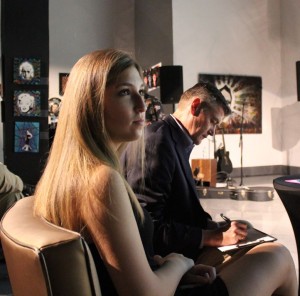 one of the more pivotal sequences in the film, a seconds-long shot of the scars on the young woman’s wrist that betrayed the fact that she’s a cutter. “It shows there are things you just don’t know about random people,” mused Julia. But more than that, it heightened the ending, in which after the two of them part at the foot of the stairs to his apartment and go their separate ways, the young woman turns around and goes after him – a rather hopeful note for a self-sabotaging, NSSI binge-drinker who uses alcohol, drugs and cutting
one of the more pivotal sequences in the film, a seconds-long shot of the scars on the young woman’s wrist that betrayed the fact that she’s a cutter. “It shows there are things you just don’t know about random people,” mused Julia. But more than that, it heightened the ending, in which after the two of them part at the foot of the stairs to his apartment and go their separate ways, the young woman turns around and goes after him – a rather hopeful note for a self-sabotaging, NSSI binge-drinker who uses alcohol, drugs and cutting 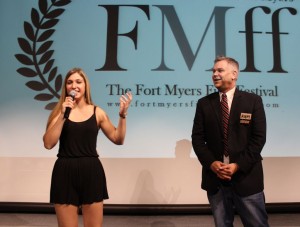 to reduce negative emotions and feel something, anything besides numbness and emptiness.
to reduce negative emotions and feel something, anything besides numbness and emptiness.
But even a woman with a deep-seated maladaptive personality can nonetheless make profound Nietzschean sense. “The most important line in the film is when she says the past is an illusion and the present is the only thing that matters,” remarked one audience member, prompting the 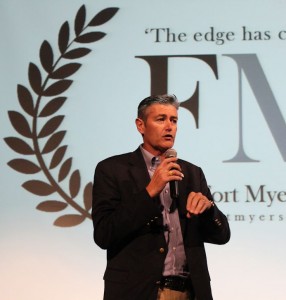 rest of us to have that “aha” moment, realizing we’d almost missed the crux of the entire film.
rest of us to have that “aha” moment, realizing we’d almost missed the crux of the entire film.
Still, the odds seemed stacked against the girl and the guy finding lasting happiness, and that purposeful ambiguity also characterized the final film of the night. At seven minutes running time, the Australian film Waiting for an Angel featured a 16-year-old girl who is her infant brother’s only hope of survival because of the neglect and dereliction of their alcoholic, drug-addled, verbally abusive mother who’s incapable of caring for herself, never mind a toddler. 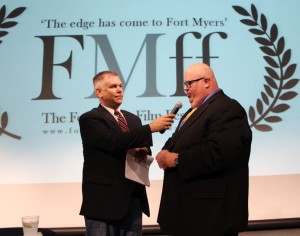 For a moment, it appears that the girl is going to run away from home, but in the end, the front door opens and the baby crawls toward two outstretched arms. Is it the sister? Has she come back for her brother? Will she take him with her, or will she stay there to protect him even though it’s a horrible situation for her? Or is it someone else at the door? The mother, perhaps? A stranger? The filmmakers leave it for the audience to supply
For a moment, it appears that the girl is going to run away from home, but in the end, the front door opens and the baby crawls toward two outstretched arms. Is it the sister? Has she come back for her brother? Will she take him with her, or will she stay there to protect him even though it’s a horrible situation for her? Or is it someone else at the door? The mother, perhaps? A stranger? The filmmakers leave it for the audience to supply  their own ending to this sad, deeply depressing, disturbingly hopeless, overwhelmingly dark film.
their own ending to this sad, deeply depressing, disturbingly hopeless, overwhelmingly dark film.
“I really hope she left home, took the brother and left that terrible mother,” said Julia DeTomaso, voicing the sentiment in the room. “It really got the heartstrings going …. Although I think the baby could have been better.” (Yes, Julia has that sort of sense of humor.)
 But not everyone was convinced of a happy ending. “Sure, she wants to leave, who wouldn’t want to leave” countered one audience member. “But where was she going to go? And [the filmmakers] showed that. [The place she was going to run away to] was just as desolate. The only person she has to rely on is herself. And in that short amount of time, [the filmmakers] showed that.”
But not everyone was convinced of a happy ending. “Sure, she wants to leave, who wouldn’t want to leave” countered one audience member. “But where was she going to go? And [the filmmakers] showed that. [The place she was going to run away to] was just as desolate. The only person she has to rely on is herself. And in that short amount of time, [the filmmakers] showed that.”
But not everything that happened inside the Davis Art Center on 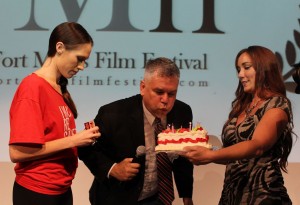 Labor Day night was dark and depressing. The rain stopped, as did the waterfall splashing down the grand atrium’s inside column. Julia DeTomaso’s sang and played guitar beautifully. And Producing Director Melissa Tschari DeHaven and Amy Raddatz surprised Eric with a candled birthday cake, which he happily extinguished with a huff and puff that brought the
Labor Day night was dark and depressing. The rain stopped, as did the waterfall splashing down the grand atrium’s inside column. Julia DeTomaso’s sang and played guitar beautifully. And Producing Director Melissa Tschari DeHaven and Amy Raddatz surprised Eric with a candled birthday cake, which he happily extinguished with a huff and puff that brought the  house down.
house down.
You see, T.G.I.M. is not just about intellectualizing over intriguing indie films, shorts and documentaries. It’s about socializing, camaraderie and networking with people who, like you, enjoy the arts, culture and film.
Don’t miss out. The next T.G.I.M. takes place on the first Monday night in October. See you October 3.
Related Posts:
- Dialogue is the keynote of Thank God for Indie Mondays
- Season Seven (2016-2017) T.G.I.M. Schedule
- September TGIM celebrity judge Jason Maughan
- September TGIM celebrity judge Dan Miller
- August TGIM celebrity judge Kaycie Lee
- August TGIM celebrity judge Justin Verely
- Recap of August’s T.G.I.M. screenings
- August T.G.I.M. entertainer, singer-songwriter Gabrielle Macafee













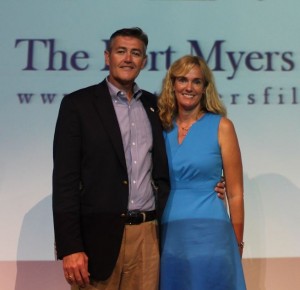

 Tom Hall is both an amateur artist and aspiring novelist who writes art quest thrillers. He is in the final stages of completing his debut novel titled "Art Detective," a story that fictionalizes the discovery of the fabled billion-dollar Impressionist collection of Parisian art dealer Josse Bernheim-Jeune, thought by many to have perished during World War II when the collection's hiding place, Castle de Rastignac in southern France, was destroyed by the Wehrmacht in reprisal for attacks made by members of the Resistance operating in the area. A former tax attorney, Tom holds a bachelor's degree as well as both a juris doctorate and masters of laws in taxation from the University of Florida. Tom lives in Estero, Florida with his fiancee, Connie, and their four cats.
Tom Hall is both an amateur artist and aspiring novelist who writes art quest thrillers. He is in the final stages of completing his debut novel titled "Art Detective," a story that fictionalizes the discovery of the fabled billion-dollar Impressionist collection of Parisian art dealer Josse Bernheim-Jeune, thought by many to have perished during World War II when the collection's hiding place, Castle de Rastignac in southern France, was destroyed by the Wehrmacht in reprisal for attacks made by members of the Resistance operating in the area. A former tax attorney, Tom holds a bachelor's degree as well as both a juris doctorate and masters of laws in taxation from the University of Florida. Tom lives in Estero, Florida with his fiancee, Connie, and their four cats.